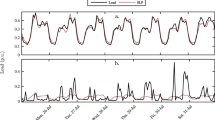Abstract
Developing energy consumption models for smart buildings is important for studying demand response, home energy management, and distribution network simulation. In this work, we develop parsimonious Markovian models of smart buildings for different periods in a day for predicting electricity consumption. To develop these models, we collect two data sets with widely different load profiles over a period of seven months and one year, respectively. We validate the accuracy of our models for load prediction and compare our results with neural networks.
Access this chapter
Tax calculation will be finalised at checkout
Purchases are for personal use only
Preview
Unable to display preview. Download preview PDF.
Similar content being viewed by others
References
Keshav, S., Rosenberg, C.: Direct adaptive control of electricity demand. Technical Report CS-2010-17, University of Waterloo (September 2010)
Richardson, I., Thomson, M., Infield, D., Clifford, C.: Domestic electricity use: A high-resolution energy demand model. Energy and Buildings 42(10), 1878–1887 (2010)
Asrari, A., Javan, D.S., Javidi, M.H., Monfared, M.: Application of gray-fuzzy-markov chain method for day-ahead electric load forecasting. Przeglad Elektrotechniczny-Electrical Review 2012(3), 228–237 (2012)
Hippert, H.S., Pedreira, C.E., Souza, R.C.: Neural networks for short-term load forecasting: A review and evaluation. IEEE Transactions on Power Systems 16, 44–55 (2001)
Rabiner, L.R.: A tutorial on hidden markov models and selected applications in speech recognition. Proc. IEEE 77(2), 257–285 (1989)
Hayati, M., Shirvany, Y.: Artificial neural network approach for short term load forecasting for illam region. International Journal of Electrical, Computer, and System Engineering 1(2), 121–125 (2007)
Ardakanian, O., Keshav, S., Rosenberg, C.: Markovian models for home electricity consumption. In: Proc. ACM SIGCOMM Green Networking Workshop (2011)
Neural Network Toolbox, http://www.mathworks.com/products/neural-network/
Author information
Authors and Affiliations
Editor information
Editors and Affiliations
Rights and permissions
Copyright information
© 2012 Springer-Verlag Berlin Heidelberg
About this paper
Cite this paper
Haider, M.K., Ismail, A.K., Qazi, I.A. (2012). Markovian Models for Electrical Load Prediction in Smart Buildings. In: Huang, T., Zeng, Z., Li, C., Leung, C.S. (eds) Neural Information Processing. ICONIP 2012. Lecture Notes in Computer Science, vol 7664. Springer, Berlin, Heidelberg. https://doi.org/10.1007/978-3-642-34481-7_77
Download citation
DOI: https://doi.org/10.1007/978-3-642-34481-7_77
Publisher Name: Springer, Berlin, Heidelberg
Print ISBN: 978-3-642-34480-0
Online ISBN: 978-3-642-34481-7
eBook Packages: Computer ScienceComputer Science (R0)




